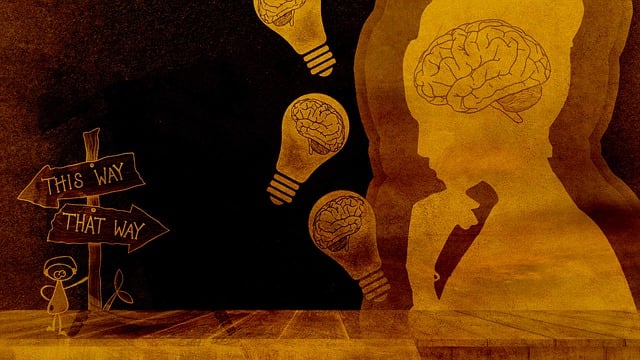Arvada EMDR Therapy is an innovative approach to emotional healing, focusing on cultivating self-awareness and emotional intelligence (EI). By enhancing self-regulation skills through techniques like mindfulness, deep breathing, and cognitive reframing, individuals gain better emotional control, stress management, and decision-making abilities. This therapy empowers clients to process traumatic memories and negative thought patterns, boosting confidence, alleviating anxiety, and improving relationships. It serves as a powerful tool for personal growth, fostering resilience and enabling individuals to navigate challenges with greater ease and emotional awareness, making it an effective method for mental health professionals.
Emotional intelligence (EQ) is a powerful tool for personal growth and success. In today’s complex world, understanding and managing our emotions is crucial for navigating relationships, making informed decisions, and overcoming challenges. This article delves into the foundational aspects of EQ, offering insights on self-awareness, a key component essential for personal development. We explore effective strategies, including Arvada EMDR Therapy, known as a game-changer in unlocking emotional potential, enhancing self-regulation, cultivating empathy, and building resilience—all vital skills for thriving in all areas of life.
- Understanding Emotional Intelligence: The Foundation of Self-Awareness
- Arvada EMDR Therapy: A Powerful Tool for Unlocking Emotional Potential
- Enhancing Self-Regulation: Techniques to Manage Emotions Effectively
- Cultivating Empathy: Walking in Others' Shoes for Deeper Connections
- Building Resilience: Overcoming Challenges with Emotional Intelligence
Understanding Emotional Intelligence: The Foundation of Self-Awareness

Understanding Emotional Intelligence begins with self-awareness—a cornerstone of Arvada EMDR Therapy. This foundational aspect involves recognizing and interpreting one’s emotions accurately, both within oneself and in others. By cultivating self-awareness, individuals can better navigate their emotional landscape, leading to enhanced emotional regulation skills. This is particularly crucial for managing mood swings effectively, a key focus in Mood Management strategies.
Through practices such as mindful observation and introspection, individuals learn to identify the physical and mental cues that signal various emotions. This increased self-awareness facilitates better Emotional Regulation, enabling people to respond thoughtfully rather than reacting impulsively to their feelings. Moreover, this understanding forms the basis for developing a robust Self-Care Routine, an essential component of promoting better mental health in today’s stressful world.
Arvada EMDR Therapy: A Powerful Tool for Unlocking Emotional Potential

Arvada EMDR Therapy stands out as a powerful and effective approach to unlocking emotional potential and achieving profound personal growth. This innovative method, rooted in eye movement desensitization and reprocessing (EMDR), has been extensively studied and proven successful in addressing a wide range of mental health challenges. Through Arvada EMDR Therapy, individuals can safely explore and process complex emotions, traumatic memories, and negative thought patterns, leading to significant improvements in emotional intelligence and overall well-being.
The therapy facilitates a unique connection between the mind and body, enabling clients to reprocess distressing events and beliefs that may be hindering their emotional growth. By inducing bilateral stimulation—typically through side-to-side eye movements, tones, or taps—the brain is supported in re-integrating traumatic memories, thereby reducing their intensity and impact. This process not only aids in the resolution of past traumas but also boosts confidence and enhances mood management skills, empowering individuals to navigate life’s challenges with greater resilience and emotional awareness. Furthermore, Arvada EMDR Therapy is a valuable tool for mental health professionals, offering a structured framework for risk assessment and evidence-based treatment delivery within their practice.
Enhancing Self-Regulation: Techniques to Manage Emotions Effectively

Emotional intelligence building involves mastering self-regulation, a key component of managing emotions effectively. Techniques like Arvada EMDR Therapy offer powerful tools for this purpose. By helping individuals process and resolve past traumatic memories, EMDR can significantly enhance emotional control and resilience. This therapy promotes a deeper understanding of one’s feelings, allowing for better decision-making and stress management in the face of challenging situations.
Incorporating self-regulation strategies into daily life includes mindfulness practices, deep breathing exercises, and cognitive reframing. These techniques empower individuals to recognize emotional triggers, respond calmly, and adapt their thoughts and behaviors accordingly. This not only boosts confidence but also serves as a potent depression prevention strategy and offers anxiety relief. By regulating emotions, one can foster healthier relationships, improve communication, and navigate personal and professional challenges with greater ease.
Cultivating Empathy: Walking in Others' Shoes for Deeper Connections

Cultivating empathy is a powerful tool for building emotional intelligence and fostering deeper connections with others. It involves stepping into someone else’s shoes to understand their perspective, feelings, and experiences. This ability to walk in another person’s shoes allows us to create stronger bonds, resolve conflicts more effectively, and offer genuine support. When we practice empathy, we become more attuned to the emotions of those around us, enabling us to provide comfort, validate their feelings, and respond with care.
In Arvada EMDR Therapy sessions, clients often explore these empathetic connections as a means to enhance self-awareness exercises and mindfulness meditation practices. By learning to observe and regulate emotions, individuals can better manage stress and develop emotional resilience. Incorporating techniques like emotional regulation strategies and mindfulness meditation can strengthen one’s ability to empathize, creating a positive feedback loop that deepens both personal growth and interpersonal relationships.
Building Resilience: Overcoming Challenges with Emotional Intelligence

Building emotional intelligence (EI) is a powerful tool for cultivating resilience, enabling individuals to navigate life’s challenges with greater ease. When faced with difficulties, those with high EI are better equipped to understand and manage their emotions, leading to more effective coping strategies. This process involves recognizing triggers, processing feelings, and responding thoughtfully rather than reacting impulsively. For instance, Arvada EMDR Therapy has been proven effective in helping individuals process traumatic memories and develop healthier emotional responses.
By fostering resilience through EI development, individuals gain a sense of empowerment over their emotional well-being. This isn’t just about overcoming depression or anxiety; it’s about building strong coping skills that support overall mental health. Incorporating self-care routines into daily life—a crucial aspect of coping skills development—becomes more manageable with enhanced EI, fostering a sense of balance and peace amidst challenges.
Emotional intelligence is a powerful tool for personal growth and enhanced relationships. By understanding the foundation of self-awareness, leveraging techniques like Arvada EMDR Therapy for emotional unlockage, cultivating empathy, and building resilience, individuals can navigate life’s challenges with greater ease. These strategies empower folks to make meaningful connections, foster healthy interactions, and lead more fulfilling lives.














